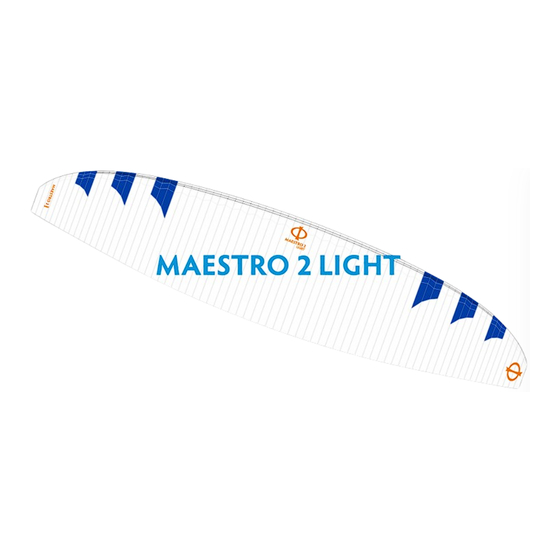
Table of Contents
Advertisement
Quick Links
Advertisement
Table of Contents

Summary of Contents for PHI MAESTRO 2 light
- Page 1 Manual Version 1.02 vom 19.09.2022...
- Page 2 Technical description The MAESTRO 2 light has 78 cells across the entire span, of which 9 cells each on the Stabilo are designed as closed cells. This creates a very stable and homogeneous wing. The profiles used combine high performance with a very forgiving flight behavior.
-
Page 3: Target Group
The MAESTRO 2 light is only approved for operation within a certain weight range. It is the total weight, including pilot, paraglider and harness (and other equipment). If the MAESTRO 2 light is flown in the lower half of the legal weight range, reduced agility can be expected. In strong turbulences a... - Page 4 Flying turns A turn is an interaction of inner brake, outer brake and weight shi ing. The art is the right dosage. The MAESTRO 2 light is characterized by a sensitive handling. Small brake inputs are enough to fly precise turns.
-
Page 5: Rapid Descents
MAESTRO 2 light can be controlled to a limited extent via the C-risers. In combinations with weight shi , relatively good directional corrections are possible. A safe landing is also possible with this technique. The C-risers should only be pulled down slightly to avoid a stall. -
Page 6: Asymmetric Collapse
50% of the span affected, the glider shows a more dynamic reaction: Due to the increased drag of the folded wing, the MAESTRO 2 light will start to turn to the side of the collapse. At the same time,... -
Page 7: Frontal Collapse
- one side is slowed down too much in slow flight (for example during thermal flying) If an accidentally initiated negative turn is corrected immediately, the MAESTRO 2 light goes into normal flight without any major loss of altitude. The brake that has been pulled too far should be released until the airflow on the inner wing attaches again. -
Page 8: Winch Launch
A er a big collapse or a er a badly executed full stall, a part of the wing might be tangled up in the lines, and wonʼt reopen automatically. This is what you call a cravate. During our extensive test flights with the MAESTRO 2 light we never experienced a cravate but this situation can not be eliminated for any paraglider. - Page 9 In flight, the MAESTRO 2 light can now be accelerated by pushing the speed bar, which results in a reduction of the angle of attack and as a consequence an increase of airspeed. The speed increase compared to trim speed is about 15 - 17km/h.
-
Page 10: Service And Maintenance
Attention: If the C handle is pulled down too far, you will stall the wing! The C-Handle is not a substitute for the brake line! This technique is primarily intended to adapt the accelerator travel or to correct the direction when the accelerator is pushed. Service and maintenance General advice With proper and careful handling of the paraglider, it will remain in perfect technical condition for many years even when used... -
Page 11: Registration, Warranty
Exceptions are the replacement of lines as well as the repair of small tears (up to 5 cm, which do not affect seams) or holes in the cloth, which can be repaired with the original PHI repair set. A small set of sticking cloth is supplied with the wing. - Page 12 PHI, eine Marke der Papesh GmbH Grillparzerstrasse 10 6067 ABSAM Österreich...
-
Page 13: Technical Data
Technical Data MAESTRO 2 light size number of cells projected span 8,40 8,64 8,81 9.26 9,49 9,69 10,10 projected area m² 16,96 17,83 18.82 20.82 21.81 22.77 24,71 projected aspect ratio 4,17 4,17 4.13 4.13 4.13 4.13 4.13 flat span... -
Page 14: Overview Risers
Overview risers... - Page 15 R07 riser...
- Page 16 Superlight riser RZ3. The mounting of the so link riser / line connection is demanding! It should be done by an expert: service workshop or flying instructor.
- Page 17 Overview wing...
- Page 18 Leineplan...


Need help?
Do you have a question about the MAESTRO 2 light and is the answer not in the manual?
Questions and answers